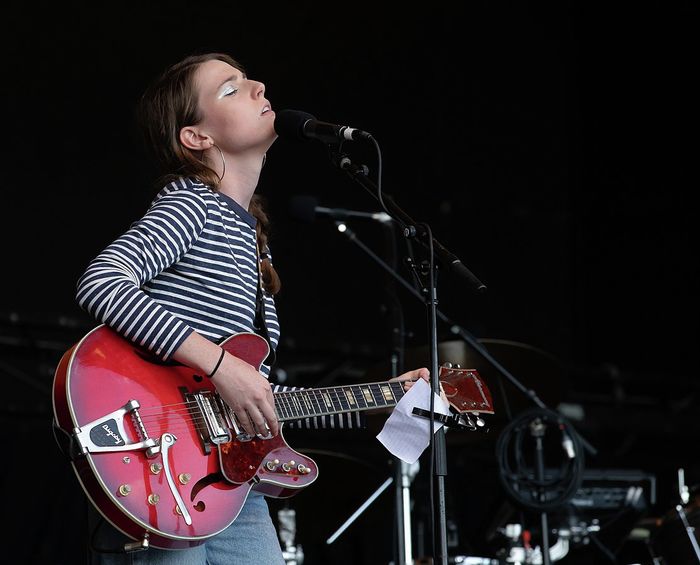The New Abnormal is self aware and unremorseful
Alex Spencer dissects the newest offering from The Strokes, finding a sound that has matured yet remains characteristically arrogant.

In the seven years since their last full-length LP, fans of The Strokes have been held in suspense over the band’s direction and even willingness to perform. We’ve witnessed solo efforts from guitarist Albert Hammond Jr., the debut albums of CRX and Machinegum, and the experimentation of Julian Casablancas’ work with The Voidz. This was a group of musicians desperate to fulfil their creative visions, away from the apparent compromise that hindered The Strokes on the 2013 Comedown Machine.
Casablancas has publicly stated his ambivalence towards their 2013 and 2011 works, and The Strokes’ subsequent hiatus suggests that ideas had begun to run thin. Indeed, their 2016 EP, Future Present Past, exhibited a tortured yearning for a new angle.
"The blueprint for writing addictive tracks remains, but there is an added progression which is afforded to many tracks on the album."
The New Abnormal thus comes as a welcome surprise to Strokes fans, relieved that there is life in the New York five-piece yet. It is a more mature work, and more interesting than its recent predecessors, exhibiting a subtlety foreign to many of its contemporaries.
The album flows from classic Strokes riffs and discordant imagery to 80s-infused tracks such as ‘Eternal Summer’ and ‘Ode To The Mets’, which show an attempt at a new direction – the introduction of Rick Rubin as producer can be thanked for such forays.
The blueprint for writing addictive tracks remains, but there is an added progression which is afforded to many tracks on the album. ‘The Adults Are Talking’ and ‘Why Are Sundays So Depressing?’ evolve into nonchalant guitar riffs, the latter’s tremolo-laden guitar a perfect antidote to the song’s overall message of lustful arrogance.
Having taken back full writing control in the band, Casablancas’ lyricism never fails to allude rather than explain. He speaks often in non-sequiturs, implying a lack of concern for our understanding, but these only add an honesty to the sentiments expressed as his own. He contemplates his reluctance to change on ‘Not The Same Anymore’ – “I couldn’t change, it’s too late…Late again, I can’t grow up” – showing a self-awareness that is remorseful, but unapologetic.
“The album resonates more on account of its restoration of The Strokes’ individuality and swagger.”
Tracks such as ‘Brooklyn Bridge to Chorus’ and ‘At The Door’ veer down different musical paths, yet their message hovers around an understanding of the writer’s defects: Casablancas’ feelings of introversion and insignificance. Much of The New Abnormal hinges on an awareness of drifting apart from people but refuses to criticise this. To the romantic Strokes fan, this could perhaps be viewed as a stretched metaphor for the band’s relationship with its audience in recent years.
The Strokes appear typically unconcerned in general with our reaction to their work. Casablancas’ frustrations toward their previous two albums cannot be said of The New Abnormal, and the influence of time away with The Voidz is evident in heavier production and the penchant for allusion in his lyrics. In characteristic fashion, and without veering into truism, Casablancas returns to writing for his own pleasure, with a seeming disregard for appeasing any particular audience.
The New Abnormal comes at a pertinent time – the title refers to the climate crisis but finds a happy context in the present day – fitting for a band that seems to inadvertently strike a relatable chord with its listeners. One can only imagine Casablancas’ joy at this prophetic accident, so often himself the spokesperson of an ‘invisible war’ going on in the modern age.
But the album resonates more on account of its restoration of The Strokes’ individuality and swagger, so marked in their first three LPs. These albums established for the band their own style of youthful confidence layered with scepticism. No longer ‘youthful’, The New Abnormal restores The Strokes’ image with an added maturity and demonstrates a renewed cohesion after a period of self-indulgent solo exploits. It is sensitive and self-aware, but addictively unremorseful in true Strokes fashion.
 News / Cambridge student numbers fall amid nationwide decline14 April 2025
News / Cambridge student numbers fall amid nationwide decline14 April 2025 Lifestyle / First year, take two: returning after intermission14 April 2025
Lifestyle / First year, take two: returning after intermission14 April 2025 News / Greenwich House occupiers miss deadline to respond to University legal action15 April 2025
News / Greenwich House occupiers miss deadline to respond to University legal action15 April 2025 Comment / The Cambridge workload prioritises quantity over quality 16 April 2025
Comment / The Cambridge workload prioritises quantity over quality 16 April 2025 Sport / Cambridge celebrate clean sweep at Boat Race 202514 April 2025
Sport / Cambridge celebrate clean sweep at Boat Race 202514 April 2025





